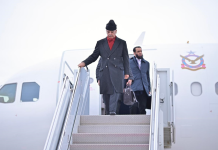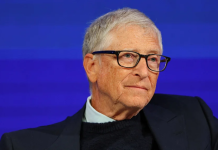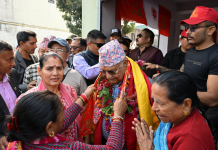Rio de Janeiro, Brazil, Oct 30 Residents of a Rio de Janeiro community lined up their dead in harrowing scenes Wednesday after Brazil’s bloodiest police raid killed at least 119 people, spotlighting the city’s controversial war against drug gangs entrenched in poor neighborhoods.
President Luiz Inacio Lula da Silva called for action against organized crime that does not endanger police or civilians, as Brazil’s security challenges were laid bare just days before it hosts COP30 UN climate talks in the Amazon.
Families of the dead decried what they described as executions by police, while the state government hailed a successful operation against a powerful criminal group that has taken over large swaths of Rio de Janeiro.
The divisive police raid exposed the violent underbelly of a city beloved by tourists for its idyllic beaches and vibrant culture.
State authorities said the provisional death toll now stood at 119, including 115 suspected criminals and four police officers.
“We cannot accept that organized crime continues to destroy families, oppress residents, and spread drugs and violence throughout the cities,” Lula wrote on X.
“We need coordinated work that strikes at the backbone of drug trafficking without putting innocent police officers, children, and families at risk.”
The veteran leftist, 80, is seeking a fourth term in office in the 2026 elections in which Brazil’s security challenges are expected to be a major campaign issue.
He sent his justice minister Ricardo Lewandowski to Rio de Janeiro for a meeting with right-wing state governor Claudio Castro to offer cooperation from the federal government.
Lewandowski told a press conference he had offered to aid Rio to “overcome this security crisis as quickly as possible.”
- 'They slit my son's throat' -
A day after the police operation paralyzed the city, residents of the Complexo da Penha favela recovered dozens of bodies from a forest on its outskirts, including one that was decapitated, AFP journalists witnessed.
"They slit my son's throat, cut his neck, and hung the head from a tree like a trophy," said Raquel Tomas, the mother of the 19-year-old who was found decapitated.
"They executed my son without giving him a chance to defend himself. He was murdered," she told AFP, her voice shaking.
"Everyone deserves a second chance. During an operation, police should do their job, arrest suspects, but not execute them," Tomas added.
Lawyer Albino Pereira Neto, who represents three families that lost relatives, told AFP some of the bodies bore "burn marks" and that a number of those killed had been tied up.
Some were "murdered in cold blood," he said.
The raid also drew alarm from abroad.
UN chief Antonio Guterres was "greatly concerned" by the number of casualties, his spokesman Stephane Dujarric told reporters.
The Office of the United Nations High Commissioner for Human Rights said it was "horrified" and called for "swift investigations."
Supreme Court Justice Alexandre de Moraes summoned Castro to a hearing on Monday to explain the police actions.















